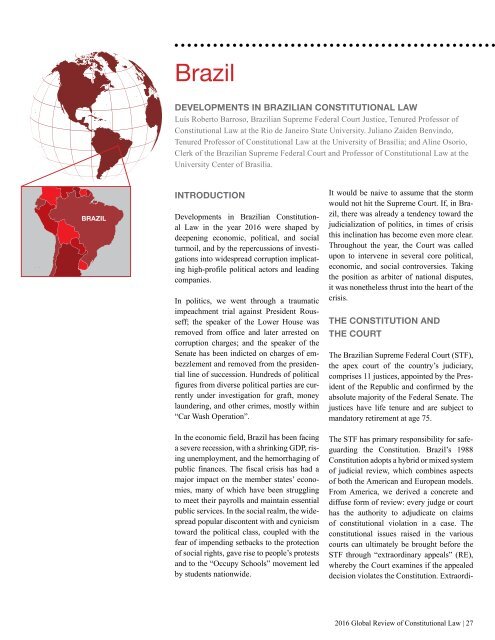2016 Global Review of Constitutional Law
I-CONnect–Clough Center collaboration.
I-CONnect–Clough Center collaboration.
Create successful ePaper yourself
Turn your PDF publications into a flip-book with our unique Google optimized e-Paper software.
Brazil<br />
DEVELOPMENTS IN BRAZILIAN CONSTITUTIONAL LAW<br />
Luís Roberto Barroso, Brazilian Supreme Federal Court Justice, Tenured Pr<strong>of</strong>essor <strong>of</strong><br />
<strong>Constitutional</strong> <strong>Law</strong> at the Rio de Janeiro State University. Juliano Zaiden Benvindo,<br />
Tenured Pr<strong>of</strong>essor <strong>of</strong> <strong>Constitutional</strong> <strong>Law</strong> at the University <strong>of</strong> Brasília; and Aline Osorio,<br />
Clerk <strong>of</strong> the Brazilian Supreme Federal Court and Pr<strong>of</strong>essor <strong>of</strong> <strong>Constitutional</strong> <strong>Law</strong> at the<br />
University Center <strong>of</strong> Brasília.<br />
BRAZIL<br />
INTRODUCTION<br />
Developments in Brazilian <strong>Constitutional</strong><br />
<strong>Law</strong> in the year <strong>2016</strong> were shaped by<br />
deepening economic, political, and social<br />
turmoil, and by the repercussions <strong>of</strong> investigations<br />
into widespread corruption implicating<br />
high-pr<strong>of</strong>ile political actors and leading<br />
companies.<br />
In politics, we went through a traumatic<br />
impeachment trial against President Rousseff;<br />
the speaker <strong>of</strong> the Lower House was<br />
removed from <strong>of</strong>fice and later arrested on<br />
corruption charges; and the speaker <strong>of</strong> the<br />
Senate has been indicted on charges <strong>of</strong> embezzlement<br />
and removed from the presidential<br />
line <strong>of</strong> succession. Hundreds <strong>of</strong> political<br />
figures from diverse political parties are currently<br />
under investigation for graft, money<br />
laundering, and other crimes, mostly within<br />
“Car Wash Operation”.<br />
In the economic field, Brazil has been facing<br />
a severe recession, with a shrinking GDP, rising<br />
unemployment, and the hemorrhaging <strong>of</strong><br />
public finances. The fiscal crisis has had a<br />
major impact on the member states’ economies,<br />
many <strong>of</strong> which have been struggling<br />
to meet their payrolls and maintain essential<br />
public services. In the social realm, the widespread<br />
popular discontent with and cynicism<br />
toward the political class, coupled with the<br />
fear <strong>of</strong> impending setbacks to the protection<br />
<strong>of</strong> social rights, gave rise to people’s protests<br />
and to the “Occupy Schools” movement led<br />
by students nationwide.<br />
It would be naive to assume that the storm<br />
would not hit the Supreme Court. If, in Brazil,<br />
there was already a tendency toward the<br />
judicialization <strong>of</strong> politics, in times <strong>of</strong> crisis<br />
this inclination has become even more clear.<br />
Throughout the year, the Court was called<br />
upon to intervene in several core political,<br />
economic, and social controversies. Taking<br />
the position as arbiter <strong>of</strong> national disputes,<br />
it was nonetheless thrust into the heart <strong>of</strong> the<br />
crisis.<br />
THE CONSTITUTION AND<br />
THE COURT<br />
The Brazilian Supreme Federal Court (STF),<br />
the apex court <strong>of</strong> the country’s judiciary,<br />
comprises 11 justices, appointed by the President<br />
<strong>of</strong> the Republic and confirmed by the<br />
absolute majority <strong>of</strong> the Federal Senate. The<br />
justices have life tenure and are subject to<br />
mandatory retirement at age 75.<br />
The STF has primary responsibility for safeguarding<br />
the Constitution. Brazil’s 1988<br />
Constitution adopts a hybrid or mixed system<br />
<strong>of</strong> judicial review, which combines aspects<br />
<strong>of</strong> both the American and European models.<br />
From America, we derived a concrete and<br />
diffuse form <strong>of</strong> review: every judge or court<br />
has the authority to adjudicate on claims<br />
<strong>of</strong> constitutional violation in a case. The<br />
constitutional issues raised in the various<br />
courts can ultimately be brought before the<br />
STF through “extraordinary appeals” (RE),<br />
whereby the Court examines if the appealed<br />
decision violates the Constitution. Extraordi-<br />
<strong>2016</strong> <strong>Global</strong> <strong>Review</strong> <strong>of</strong> <strong>Constitutional</strong> <strong>Law</strong> | 27


